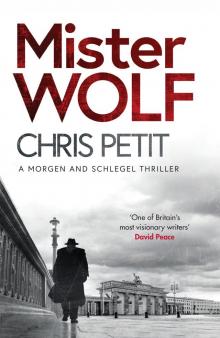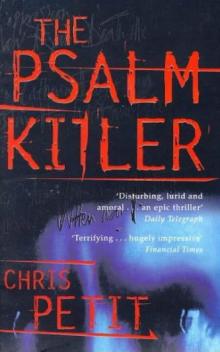- Home
- Chris Petit
The Butchers of Berlin Page 2
The Butchers of Berlin Read online
Page 2
The old man lived on the third floor. The door was shut but unlocked. Schlegel pushed it open and saw bedrolls on the floor of the tiny living space and kitchen, and more in the corridor, making it more like a refugee camp than anything resembling a home. The old man would have had no choice about how many were billeted with him. Schlegel counted six suitcases. Nappies hung over the sink. No pictures or signs of personal possessions.
At the end of a corridor stood a tomblike bedroom, with space only for a single bed and chair.
Under the bed he found the man’s military trunk with army postings stencilled on the top and old stickers for tourist steamships on the side. It contained only some tattered underclothes, a spare shirt, a threadbare green sweater and an empty collar box. The only two items of interest were a key and a notebook full of doodles and entries written in a minute old-fashioned Gothic script. Schlegel pocketed it, presuming it might be evidence.
The key was a small one, like those for lockers in cloakrooms, with a tag and the number, 2716. He took that too and thought had the old man not shot himself he would be waiting to be taken off.
Below in the courtyard he could see Stoffel smoking his cheroot while absent-mindedly kicking the foot of the dead warden. He turned away, and asked himself where the old man could possibly have hidden his pistol.
Behind a chest in what passed for the reception room, he found a chimney cavity where a stove had once stood. He got down on all fours and put his arm up the hole to see if there was a ledge. He wasn’t sure if he looked round because he heard someone enter or if the woman had been watching him.
He stood up brushing his hands, like a man caught out. She was a tiny creature, stick-thin. He couldn’t say if his presence frightened her. Her head was covered with a scarf, tied like a pirate’s, a detail that took Schlegel back to games played in childhood.
The woman blurted out to ask why his hair was white.
Because that was the way it was, he said self-consciously.
She looked exotic, Oriental almost, quite old but interesting and attractive. She kept giving him odd looks.
He asked, ‘Why did he shoot the warden?’
‘Perhaps he intended to do something useful before he died.’
That made sense; block wardens were generally loathed.
Schlegel wondered if her real reason for being there was to frisk the place for anything useful. Why hadn’t she been taken with the rest?
They were interrupted by heavy footsteps coming upstairs. At least three men, stopping on their floor. The woman paled, her terror palpable, and shrank back as they passed, followed by banging on a door further down, with shouts to open up. The woman’s composure was quite gone. Schlegel turned away. She gasped as though he would betray her, and again as he stepped outside.
Three sweaty and dishevelled marshals stood in the corridor.
‘We’re short,’ said the eldest, a little man who bristled with self-importance.
Schlegel recognised him as one of the men Stoffel had ordered to take out the bodies.
The door was unlocked. Schlegel led the way. The place was empty. Two tiny rooms, badly sectioned. Two beds, one made, one unmade. The same stale atmosphere of deceit and despair. The marshals seemed reluctant to leave.
‘Well?’
The one who had spoken said, ‘We have to fill the quota.’
‘Show me,’ Schlegel said, indicating the man’s list.
Typewritten columns of names and addresses, nearly all ticked. Against the old man’s name was written ‘deceased’.
‘What of those you can’t account for?’
‘We must search for them.’
‘And if you don’t find them?’
‘They send us away to make up the numbers.’
Funk rolled off them in waves, on top of the prevalent smells of the building: the thin, sour stink of drains; lack of human washing; and something high and feral Schlegel put down to the greater fear left by the evacuation.
He studied the list again. The names for that apartment had two Todermanns not crossed off.
Schlegel said, ‘They must have left early or are on a night shift.’
He returned the list, went out and waited for the men. He meant to leave with them but instead returned to the old man’s apartment. The woman was standing in the same spot, shaking from head to foot. Schlegel raised a finger and waited for the footsteps to go.
It had taken – what? – thirty minutes to clear the place.
Schlegel mumbled he wasn’t there to arrest anyone. He asked if the woman was living with her sister.
Her daughter.
She stepped forward and offered to read his palm, garrulous with relief, saying she was a professional. She looked like she wanted to cling to him for protection. The situation was so ridiculous Schlegel wished he had gone downstairs.
He surprised himself by sticking out his hand, which he quickly withdrew, failing to hide his embarrassment.
The woman took it anyway. She grew calmer. Her hand was cool in his. The experience was disconcerting.
Schlegel hadn’t touched anyone in two years, avoided even shaking hands.
‘Do I have a future?’ he asked, feeling foolish for playing along.
‘Yes, not the one you expect.’ She ran her fingers over his palm. ‘But you have a past.’
He could not decide whether their strange enactment was in reaction to the brutality around them.
She gave him a stricken look and let go.
‘You’re different from the rest. Remember that, for you will see enough terrible things to turn your hair white many times over.’
He walked out without a word and went downstairs.
Outside it was trying to snow. The courtyard was empty except for the old man’s body. The warden’s was gone. Stoffel hadn’t bothered to wait. A few snowflakes drifted down. The next set of incumbents would move in with their new habits and noises and smells, and it would be as though none of it had happened.
Schlegel looked at the old man again. There was a dignity to him, unlike his victim, but he saw nothing of the war hero, just an emaciated corpse keeping its secrets.
The old man’s medal would get buried with him in an unmarked grave, preserved long after the body disintegrated; perhaps hundreds of years. Schlegel genuflected and touched the cold iron, unable to remember when anything had last aroused his curiosity. He undid the knot, his fingers stiff and clumsy. It came free. He stood up and stuffed the medal in his pocket, thinking of old recidivist habits.
Feeling he was being watched, perhaps by the strange woman upstairs, he looked around guiltily, aware that he was blushing, which was ridiculous.
An ancient, battered van drove into the yard. A tall, dark-haired man got out. The van was nondescript and had seen better days.
‘Are you the Jewish hearse?’ Schlegel asked.
The driver asked instead, ‘Where did he get the gun?’
News spread fast along all kinds of unofficial channels.
‘Can you give me a hand with the loading?’
That the driver had no help struck Schlegel as in keeping with the disjointed day.
He supposed he must look amenable; the driver certainly wouldn’t have asked Stoffel. He bent down to take the dead man’s heels. He regretted not having his hat. It was bitterly cold. At least it numbed the hangover. People usually stared at his hair but the driver seemed not to notice.
The corpse weighed so little, as though it barely consisted of matter at all.
Inside the vehicle looked like a converted bakery van, with shelves made of plywood. The casual way the driver closed the door afterwards made it seem the most normal thing to drive into a yard and collect a body. Schlegel found him handsome in a sardonic way, far more self-possessed than the men upstairs, who were always on the point of flinching, as if they expected to be hit.
He thought of cadging a lift, then decided he didn’t want to ride with a dead man. As for the notebook, he had known upstairs
he wouldn’t hand it over. No one was interested. Stoffel would have snaffled the pistol.
The driver got in the van. Schlegel watched him go, thinking about the medal. Perhaps he shouldn’t keep it. Maybe it was bad luck. What had the woman said? That he would see terrible things, enough to turn his hair white many times over.
3
Sybil still tasted vomit in her mouth. The fright of the shooting continued to boom in her head and she had to force herself not to run. Only she seemed to detect the strange, almost frenzied tempo of official traffic as everyone else went about their business. Sybil saw police and military vehicles everywhere, and the removal vans they used to take people away in waiting outside factories and tenement blocks. For months things had been quiet. A few had started to hope against hope, including Sybil, however much her mother warned they would stop at nothing in the end.
She passed through Olivaer Platz, crossed Mommsenstrasse and went down Wilmersdorfer Strasse as it tried to snow. Everything appeared normal: trams, buses, a policeman directing traffic. Cinemas, cafés, bars. A shoe-shine man with amputated legs, sitting on his box. A lorry with a flat tyre. A child with a penny whistle. In a shop window, a toy monkey with a drum. Pedestrian crossings. A big store looking forlorn. A bookshop still with a Russian dictionary in the window. A young woman, not unlike herself, in a cloche hat, glanced in brief recognition. Caught in a flow of pedestrians, Sybil crossed a busy junction, thinking she must speak to Franz. Franz worked as an orderly at the Jewish hospital. She had known him since she was at the school of design and fashion, not far from where she was now.
Rather than use a telephone in the street, which attracted patrols, Sybil marched into the Hotel Savoy in Fasanenstrasse and took a kiosk in the lobby.
It took ages to get through to the hospital, which was impossibly busy, and so long to fetch Franz that Sybil worried her money would run out.
At last he came, breathless, asking if she was all right because it was chaos at his end, with the hospital told to provide typists, marshals, doctors and nursing staff for hastily erected assembly camps for those arrested, and to prepare food for ten thousand.
‘Ten thousand!’ Sybil echoed.
Franz said, ‘It’s as though they mean to make a clean sweep.’
It no longer seemed possible to pretend. Such a level of arrest was unprecedented. Before a lull that had lasted several months, there had been only individual summonses for deportation, never any mass roundups.
Sybil also urgently needed to talk about the forged papers Franz was helping her get for her friend Lore, who was in hiding.
‘Is Lore worth it?’ he asked. ‘It will be much more difficult and dangerous now.’
Sybil said yes.
‘Call me the same time tomorrow.’
Sybil stared at the replaced receiver and feared she might altogether lack the courage to leave the booth, and would sit there until drowned in the tide of her rising panic.
She composed herself enough to walk through the lobby and smile at the ancient flunky dressed in his braided livery, whose sole job was to stand by the revolving door.
On the Ku’damm her nerve faltered at the sight of a street patrol checking papers. They had stopped a dark woman with frizzy hair.
Normally she swept past patrols with her blond head held high, secure in the knowledge that she did not conform to their stereotype. But that morning her legs disobeyed her and she knew she would soon come to a standstill, inviting arrest. Using the last of her energy, she marched into the Konditorei she was outside, thinking how much she wanted to share the security of its clientele, even for a few minutes. Smart women sat content and placid, drinking tea and eating artificial-looking cake, as if without a care in the world. Sybil was bone-weary and very frightened. Her feet ached and her chilblains burned.
She had to remember how to behave, ordering, looking around, gazing at passers-by. The white tablecloth, a pathetic attempt at luxury, was grimy. The thin tea was the usual herbal concoction. She got up and went to the toilet and rinsed her mouth and cleaned her teeth with her finger. There was no soap.
She went back, took a copy of the wretched Party newspaper, like a good little citizen, and drank her tea. The patrol was still outside, laughing and joking now.
The paper was full of such hate and rubbish. Now they didn’t have their victories to crow about it made them hate all the more, as well as starting to feel sorry for themselves, which they seemed to be even better at than hating. Whenever her mother predicted they would come in great numbers to take their people away Sybil had refused to listen. For a start, there was a labour shortage, and they were told they were needed because of their jobs. Now this. It didn’t make sense.
A voice came out of nowhere. ‘Fräulein?’
Sybil jumped. She looked up at what appeared to be a pleasant, elderly gentleman, wanting to know if she had finished with the paper.
He wore a Party pin. She dreaded he would insist on sitting with her, pat her on the knee and talk about the Jewish filth being rounded up. Perhaps she should let him sleep with her, in exchange for his protection. But he paid her no attention, accepted the paper and walked away.
The lesson was salutary. From now on she could not allow for any more approaches made unawares. Next time the voice could be saying she had better come with them.
Sybil reached the conclusion she had been dreading. She would have to join Lore and go underground. The ones that went into hiding were known as U-boats, with reason; one might as well be at the bottom of the ocean. Many buckled from the pressure. Those with the discipline to forgo all outside contact had the best chance. That was not her, and probably not Lore.
4
Schlegel was coming up from the cells after searching in vain for his hat when Stoffel, standing by the main desk, collared him again and said, ‘You’ll do. We have another body.’
‘Why me again?’
He had been looking forward to slipping off and going back to bed.
‘You’re fraud, son, I know that, but as of oh-six hundred hours this morning one slacker is requisitioned to the homicide department on my say-so.’
Schlegel knew the rest of the man’s crew were down in the cells still sleeping it off. He had just seen them, lying on their backs, snoring, oblivious.
‘Where’s your other glove, boy?’
He didn’t answer and followed Stoffel back to the car, confused because he was blushing for the second time that day. He supposed it must be to do with tired blood fighting the hangover.
They drove east, towards the poorer districts. Streets were empty, shops and bars boarded up. Schlegel stared at the surroundings and had trouble imagining what trees with leaves looked like.
Set on the edge of the city, bordered by the outer-ring railway, the meat district was a town in itself, a walled citadel, built fifty years before as a testament to civic pride, now fallen on hard times. It spread as far as the eye could see, a substantial complex of squat barracks, glass halls and sheds, dwarfed by the twin towers of the ice factory.
They parked on Landsberger Allee, by the north-west entrance. On top of the gate pillars stood two large statues of the Berlin bear. A line of low buildings led down to a railway siding where wagons stood. Weeds pushed up through the concrete.
Local cops, slaughterhouse and railway officials were waiting down below, looking green. A doctor and photographer were on their way. A cop led them to a cattle car, gestured to the ladder and stepped back. Stoffel’s fat arse stuck out as he went up. Schlegel heard him say, ‘Take a look at this, son.’
What he saw in the corner of the carriage more resembled something found hanging in a butcher’s shop. No evidence was left of the pain inflicted, not even a head to register death’s agony, just a flayed limbless torso, with the skin gone to reveal the muscle. What remained lay on its back, surgically treated to make it impossible to tell what sex it had been.
‘Tell me what you see,’ said Stoffel.
Dead meat was
all he could think. A rack of meat.
‘You would think they were going to eat it. No mess. No blood. Control. Precision. And where are we?’
‘A slaughterhouse.’
‘And what are we standing in?’
‘A cattle car.’
The photographer arrived. They were still waiting for the doctor. Stoffel told the photographer to get on with it. The camera flashes looked like gunshots from outside the wagon.
Stoffel said to Schlegel, ‘Here, take one of these.’
‘What is it?’
‘Grown-up pill. Make you feel better.’ Stoffel put one in his mouth. He shook another out of the cylinder for Schlegel, who couldn’t feel any worse.
‘You’re going to have to write up this one too,’ said Stoffel. ‘I’m short-staffed. It either came in on the train, which means it could have come from anywhere, and we bury it, or it was done by one of the locals.’
Stoffel asked the assembled men who had found the body. One of the railway officials said he had checked the wagon because the door was open. Old vagrants from the last war made a habit of sleeping there.
Stoffel whistled in the direction of the loitering civilians and demanded to know who was in charge. A tall fellow wearing a bowler hat and brown overalls wandered over in no hurry and announced he was Baumgarten, the slaughterhouse foreman.
Stoffel asked, ‘Any of your boys been misbehaving?’
Baumgarten, an elderly, unshaven giant with a missing top front tooth and enormous hands, was slow to answer.
‘It would be Jews,’ he eventually said.
‘What Jews?’
‘Jewish butchers.’
‘Excuse me,’ said Stoffel. ‘Since when did butchering count as war effort?’
Baumgarten agreed he was as surprised as anyone when they turned up. Most of his men had been drafted into army catering.
‘Even our trainees were shipped off and the Dutch and Danish labour we were promised never showed, so we got Jews.’
Stoffel asked whether the Jewish butchers operated according to kosher practice. Baumgarten explained they didn’t do the killing, they only prepared the carcasses afterwards. He laughed uncertainly.

 Mister Wolf
Mister Wolf The Passenger
The Passenger The Psalm Killer
The Psalm Killer The Human Pool
The Human Pool The Butchers of Berlin
The Butchers of Berlin Pale Horse Riding
Pale Horse Riding